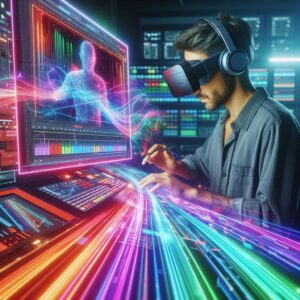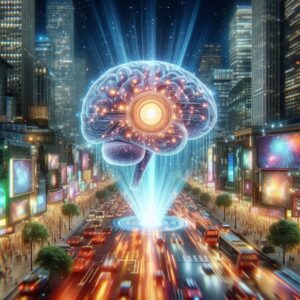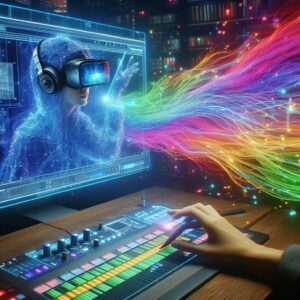Revolutionising Video Production with AI
Artificial intelligence (AI) has significantly impacted various industries, including video production. Incorporating AI technology has transformed video editing, creation, and production processes, increasing productivity and cutting costs. AI-powered video production uses advanced algorithms and machine learning techniques to automate various workflow stages, such as editing, content development, and post-production.
Thanks to this technological advancement, companies, content providers, and filmmakers now have more options for making professional-quality videos with little human involvement. The increasing influence of AI on the video creation sector will dramatically change how the sector operates.
Main Points
- AI is revolutionizing video production by automating tasks, enhancing creativity, and improving efficiency.
- AI transforms video editing by enabling automatic scene detection, object recognition, and content analysis.
- AI plays a crucial role in video content creation by generating personalized and targeted content through data analysis and predictive algorithms.
- AI significantly impacts video post-production by streamlining processes, reducing costs, and improving the overall quality of the final product.
- AI video production services offer advanced capabilities such as deep learning, natural language processing, and computer vision to enhance production and deliver high-quality results.
- The future of video production with AI is promising, with technological advancements leading to more sophisticated tools and capabilities.
- Embracing AI in video production brings benefits such as increased productivity, cost savings, and improved creativity, but also presents challenges related to data privacy, ethical considerations, and job displacement.
 How AI is Transforming Video Editing
How AI is Transforming Video Editing
Streamlining the Editing Process
AI-powered editing tools transform the video production industry by evaluating footage, identifying key areas, and modifying videos depending on predefined parameters. These techniques can identify facial expressions, emotions, and auditory cues, producing more exciting and dynamic editing. Furthermore, AI algorithms can assist with colour correction, audio enhancement, and visual effects, speeding up the editing process while reducing the time and resources required for manual editing.
Unlocking Creative Possibilities
AI also enables video editors to discover new creative options. For example, AI may assess existing video content to provide fresh and innovative editing concepts, providing editors with new insights and creative inspiration. This may result in unusual and captivating video material that appeals to audiences.
Personalizing the Viewing Experience
Furthermore, AI-powered editing tools can assist in customising videos based on audience preferences, resulting in a more tailored viewing experience. As artificial intelligence advances, video editing is expected to become more intuitive and efficient, allowing creators to focus on storytelling and creativity while AI handles the technical aspects.
The Role of AI in Video Content Creation
AI has also greatly impacted video content creation, enabling artists to create high-quality videos on a larger scale. Creators can automate video content creation with AI-powered content production tools that employ machine learning algorithms to assess data and generate intriguing narratives. These techniques can identify patterns in massive datasets, insights, and visual components that can be used to create captivating video content.
Furthermore, AI can help to automate the scripting process by creating scripts based on predefined parameters and audience preferences. This saves time and allows for creating personalised and targeted video content. Furthermore, AI has enabled the creation of hyper-personalised video content through data-driven insights.
Producers can use AI to evaluate user behaviour and preferences to guarantee that their video content reaches its intended audience. Businesses that employ video content for marketing experience a boost in conversion rates and viewer engagement with this level of customisation. In this approach, artificial intelligence has substantially enhanced video content creation, making it more efficient, customized, and scalable. It enables artists to create high-quality videos that appeal to many viewers.
The Impact of AI on Video Post-Production
In addition to editing and content creation, artificial intelligence has significantly impacted video postproduction procedures. AI-powered postproduction systems can automate audio syncing, captioning, and metadata tagging to improve productivity and accuracy. These programs can evaluate audio tracks and automatically sync them to video footage, saving editors time and effort.
Furthermore, AI can generate accurate video captions using speech recognition algorithms, making them available to hearing-impaired viewers. This improves these people’s watching experience and illustrates AI’s inclusiveness in video post-production. Furthermore, AI can scan video content and automatically identify and categorise data, making it easier to manage and search for specific footage during post-production. Furthermore, artificial intelligence has enabled the development of strong visual effects and CGI (computer-generated imagery) techniques that were previously time and resource-expensive.
AI-powered technologies enable producers to build realistic visual effects and CGI elements more efficiently, producing higher overall movie quality. These advancements have opened up new creative possibilities for filmmakers and content creators, enabling them to bring their visions to life more swiftly and precisely. As AI advances, post-production techniques are anticipated to become more streamlined and complicated, increasing the quality and impact of video content.
 AI Video Production Services: What You Need to Know
AI Video Production Services: What You Need to Know
As artificial intelligence (AI) continues to disrupt the video production industry, various AI-powered video production services have emerged to fulfil the growing demand for automated and efficient production processes. These services include video editing, content generation, post-production, and dissemination. AI video creation services provide various advantages, including faster turnaround times, lower costs, and more significant creative potential.
These adaptive services allow artists to make high-quality videos with little personal intervention, thanks to solid algorithms and machine-learning methodologies. We also want to make our AI video-production services accessible to many people, from solitary producers to businesses, and simple to use. They frequently have intuitive interfaces and configurable options, recognising that each user has unique video production requirements.
Several AI video production companies also provide cloud-based solutions, enabling seamless collaboration and remote access to video production tools. This flexibility enables creators to work successfully from anywhere worldwide while using AI to optimise production processes.
The Future of Video Production with AI
Enhanced Editing and Content Creation
Advancements in deep learning algorithms may enable AI to understand and interpret complex visual elements more accurately, leading to more precise editing and content creation capabilities.
New Creative Possibilities with VR and AR
We may see the integration of AI with virtual reality (VR) and augmented reality (AR) technologies, opening up new creative possibilities for immersive storytelling.
Democratization of Video Production
As AI becomes more widely available and affordable, we may see a democratisation of video production capabilities, allowing a broader range of producers to create high-quality videos with fewer resources. Furthermore, new industry standards and best practices for exploiting AI will emerge as AI becomes more integrated into video production workflows. This will lead to increased collaboration between AI engineers and video production specialists, as well as the development of specialised tools and solutions customised to the industry’s specific requirements.
 Embracing AI in Video Production: Benefits and Challenges
Embracing AI in Video Production: Benefits and Challenges
Using AI in video production has various advantages for consumers and businesses. AI has the potential to alter video production and viewing in various ways, including higher efficiency and cost reductions, improved creative talents, and customized content creation. Modern algorithms and machine learning technologies allow producers to streamline workflows, automate boring tasks, and focus on storytelling and creativity.
However, incorporating AI into filmmaking brings its own set of challenges. One of the most pressing problems is ensuring AI-powered goods are used ethically and responsibly. As AI increasingly integrates into video creation, creators must consider the ethical implications of using automated tools that may jeopardise privacy, bias, or misinformation.
As AI becomes increasingly involved in video production, there is growing concern about job displacement. However, this should not overwhelm the importance of creators approaching AI integration with caution and accountability. Their influence over the future of video production is critical, and their decisions will define how AI affects the industry.
Artificial intelligence has significantly impacted the video production industry, leading to increased productivity, cost savings, extended creative possibilities, and customised content development. To keep up with AI’s rapid evolution, producers must exhibit caution and accountability when introducing AI into their workflows. They must also be aware of any ethical implications and issues, ensuring that the benefits of AI are maximised while the hazards are minimised.
FAQs
What is AI-generated video?
AI-generated video uses artificial intelligence (AI) to create or manipulate video content. This can include generating realistic human faces, altering existing video footage, or creating new video content.
How does AI-generated video work?
Artificial intelligence-generated video analyses and manipulates visual data using machine learning techniques. Video footage can be created or modified using deep learning, computer vision, and generative adversarial networks (GANs).
What are the applications of AI-generated video?
AI-generated video has numerous applications, including special effects generation in the entertainment sector, personalised video content in marketing, medical imaging analysis in healthcare, and video surveillance and facial recognition in security.
What are the potential benefits of AI-generated video?
AI-generated video has the potential to reduce video production costs, provide highly realistic and personalised video content, improve efficiency in tasks such as video editing and analysis, and open up new creative possibilities in video creation.
What are the concerns surrounding AI-generated video?
Some issues with AI-generated video include the possibility of misuse, such as creating fake news or fraudulent video material, ethical questions about privacy and permission, and the possible impact on established video production sectors.
References
The Transformative Impact of AI on Video Production | Paint Room X. https://paintroomx.com/24848-the-transformative-impact-of-ai-on-video-production-17/
Mensah, G. A. (2024). Artificial Intelligence and Ethics: A Comprehensive Review of Bias Mitigation, Transparency, and Accountability in AI Systems. https://doi.org/10.62839/ajfra/2024.v1.i1.32-45
The post Using AI to Transform Video Production appeared first on Ezi Gold.
The post A Revolution in Video Production Driven by AI appeared first on Ai Ninja Toolbox.
The Article A Revolution in Video Production Driven by AI Was Found On https://limitsofstrategy.com


Your exploration of AI’s impact on video production resonates deeply with me. It’s fascinating to think about how automation is not only streamlining the production process but also pushing the boundaries of creativity. As someone who has dabbled in video making, I can appreciate the potential of AI to handle repetitive tasks, allowing creators to focus on storytelling and artistic vision.
It’s great to hear your thoughts on this! The way AI can take over those repetitive tasks really does clear up space for creativity, doesn’t it? It’s like having an assistant that handles the nitty-gritty, freeing you up to delve deeper into storytelling.
I completely agree with you. The way AI takes on repetitive tasks is definitely transforming how we engage in creative processes. It’s almost like having a reliable partner that manages the more mundane aspects, leaving us to explore our ideas more freely.
It’s really interesting to think about how AI can be that reliable partner in our creative endeavors. I’ve noticed that many people start to view AI not as a replacement but more as a tool that can help liberate their thoughts. When the repetitive tasks are handled, it opens up the space for genuine creativity to flourish.
You bring up an interesting perspective on AI as a creative ally. The idea of AI freeing up mental space really resonates with me. I’ve experienced moments where having tools that streamline repetitive tasks allowed me to think more deeply about the creative process. It’s almost like offloading some of the cognitive load so that the mind can wander into more innovative territories.
The experience you shared really captures the essence of what many creatives feel when they start using AI tools. It’s fascinating to think about how these technologies can act as silent partners in our creative journeys, providing the freedom we need to explore new ideas and push boundaries.
It really is interesting how AI can shift our creative landscapes. When I first started experimenting with these tools, I felt a mix of excitement and apprehension. It was like having a collaborator who didn’t overshadow my voice but instead nudged me toward ideas I might not have explored on my own.
I recently came across some simple skin revitalization techniques that resonate with the creative process you mentioned—offering a fresh perspective on natural beauty while encouraging us to explore new routines.
‘Natural Face Lift: Simple Skin Revitalisation Techniques’
https://yobiboy.com/natural-face-lift-simple-skin-revitalisation-techniques/.
I can relate to that blend of excitement and apprehension you felt when diving into AI. It’s such a fascinating space—almost like a conversation where the tool prompts ideas but doesn’t dictate the direction. I find it interesting how it can push us into uncharted territory creatively, allowing us to explore concepts we might not have considered before. It’s like having an extra lens to view our own thoughts through—one that helps clarify and amplify what’s already there.
You’ve hit the nail on the head with that idea of freeing up mental space. It’s kind of like giving your brain a vacation while the computer does the heavy lifting. Imagine AI is that friend who helps you carry the grocery bags while you’re busy, pondering whether you really need three different kinds of mustard in your fridge. It’s the perfect excuse to let the mind wander—maybe to some wild idea about a gourmet mustard-flavored ice cream. Okay, that might need a little work.
I really appreciate your take on it! That grocery bag analogy is spot on. It’s fascinating how AI can handle the more tedious tasks, allowing us to shift our focus to the more inventive side of things. Your idea of gourmet mustard-flavored ice cream has charm; it’s those quirky thoughts that can lead to something unexpected. Who knows, someone may take that idea and create the next big dessert trend.
You’ve hit on something really profound there. It’s a bit like having a personal assistant who tirelessly sorts through the mundane so you can be the genius artist you were always meant to be. I mean, picture it: your AI buddy, tirelessly clicking away at the boring stuff while you sip coffee and muse about the great mysteries of life—or maybe just your next big project.
You’ve nailed it. It’s like having a reliable sidekick who takes care of the mind-numbing tasks, allowing us to really dig into the creative stuff. I love the image of sipping coffee and pondering the mysteries—there’s something magical about those quiet moments before diving into whatever project we’re brewing.
It’s fascinating how the perception of AI is shifting, isn’t it? I think you’re spot on about viewing AI as a creative partner rather than a replacement. When we can delegate repetitive or mundane tasks to AI, it really does create that mental space for us to explore our ideas more freely.
You’ve captured a key part of this conversation perfectly. The idea of AI as a creative partner really does shift the way we think about our work and our potential. It’s like having a brainstorming buddy who never tires or judges, allowing us to dive deeper into our creativity.
It really is intriguing to see how the perception of AI is evolving. I agree that thinking of AI as a creative partner opens up a whole new realm of possibilities. In my experience, when I’ve delegated more mundane tasks to AI, I’ve found that I can dive deeper into my passion projects or even explore new hobbies that I’d previously sidelined due to a lack of time.
You nailed it! It’s like having an assistant who doesn’t need coffee breaks or an overtime paycheck. Imagine AI as that buddy who always volunteers to do the boring stuff—like cleaning out the garage or organizing your sock drawer—so you can just kick back and brainstorm your next big idea, or figure out how to turn a broccoli recipe into a TikTok dance.
I love the way you framed AI in that context—it’s such a vivid way to think about it. That assistant vibe is spot-on. Sure, it’s great at tackling those mundane tasks, but it also opens up so many possibilities for creativity and innovation. Imagine if more of us could let go of the repetitive chores that eat up our time. The freedom to focus on things that spark joy or ignite curiosity is pretty thrilling.
It’s true, isn’t it? That feeling of having AI handle the repetitive tasks really does feel like having an extra set of hands. It frees us up to dive deeper into our creative thoughts, allowing us to push boundaries we might have shied away from before. When the grind of the mundane is lifted, it’s surprising how quickly fresh ideas can flow.
You’ve captured that sentiment perfectly. It’s fascinating to think about how AI can actually become a creative partner rather than just a tool. For instance, I’ve noticed that when I’m not bogged down by the tedious aspects of writing—like formatting or data entry—I can actually engage more deeply with my characters and plot development. It almost feels like a mental shift, where I can let my imagination roam freely rather than getting caught up in the logistics.
I can relate to what you’re saying about the intersection of AI and creativity in video production. It’s fascinating how these tools can take care of the technical side, like editing and color grading, giving us more freedom to explore and tell our stories.
It’s interesting how tools like AI are changing the landscape of video production. The way they handle technical tasks such as editing and color grading does open up space for more nuanced storytelling. When you think about it, creators often find themselves bogged down by the intricate and sometimes tedious details of post-production. It can be draining. Freeing up that mental bandwidth allows us to focus more on the story we want to tell, the emotions we want to evoke, and the connections we long to foster with our audience.
It’s great to hear that you connect with this topic. The way AI is reshaping video production is both intriguing and a bit daunting at times. I’ve found it especially interesting how tools like AI-driven editing software can take some of the tedium off our plates, letting creators dive deeper into narrative and visual expression.
You raise some crucial points about the intersection of AI and video production. It’s fascinating how these tools can alleviate the more mundane aspects of editing, allowing creators to pour their energy into storytelling and artistry. In theory, that sounds like a win-win situation, but I find it essential to consider the larger implications.
I completely agree with you—it’s amazing how AI is reshaping creative fields like video production. The way automation tackles repetitive tasks is a game changer, right? I’ve noticed that many filmmakers are beginning to embrace tools that can handle everything from video editing to color grading. This shift allows them to channel their energy into the aspects of filmmaking that truly matter, like story and emotional resonance.
You’ve hit the nail on the head with that one. The way AI is swooping in to take care of the nitty-gritty of video production is like discovering the DVR after years of struggling with VHS tapes. Filmmakers can finally stop spending countless hours on the stuff that’s about as thrilling as watching paint dry—like sorting through footage or endlessly tweaking color settings. Now they can focus on the parts that make watching a film feel like a rollercoaster ride.